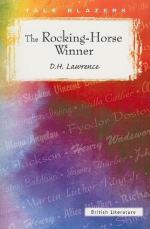|
This section contains 2,977 words (approx. 10 pages at 300 words per page) |

|
SOURCE: "Allegory and the Death of the Heart in The Rocking-Horse Winner'," in Studies in Short Fiction, Vol. 15, No. 4, Fall, 1978, pp. 391-96.
In the following study, Koban suggests that Paul's death in "The Rocking-Horse Winner" allegorically represents the death of the child in Hester—the death of her innocence and love. The critic also comments on Lawrence's philosophical ideas of love, marriage, sex, and money.
W. D. Snodgrass' famous essay on Lawrence's "The Rocking-Horse Winner" ["A Rocking Horse: The Symbol, the Pattern, the Way to Live," Hudson Review, Vol. XI, No. 2, Summer, 1958] is a very nearly exhaustive explication of the story's meaning, yet it is not I think totally exhaustive because Snodgrass—like critics in general—has overlooked one side of the story's meaning, namely the mystical side, It is very tempting to see the story as a kind of social commentary, as a "way to live" Snodgrass...
|
This section contains 2,977 words (approx. 10 pages at 300 words per page) |

|


